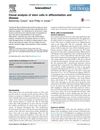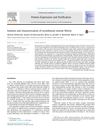 99 citations,
January 2014 in “Nature communications”
99 citations,
January 2014 in “Nature communications” Scientists created stem cells that can grow hair and skin.
 11 citations,
March 2020 in “Immunology”
11 citations,
March 2020 in “Immunology” Human prenatal skin develops an immune network early on that helps with skin formation and healing without scarring.
 June 2023 in “Research Square (Research Square)”
June 2023 in “Research Square (Research Square)” Different immune responses cause hair loss in scalp diseases, with unique patterns in scalp psoriasis possibly protecting against hair loss.
 11 citations,
July 2016 in “Current Opinion in Cell Biology”
11 citations,
July 2016 in “Current Opinion in Cell Biology” New techniques have enhanced our understanding of how stem cells function and the role of mutations in aging tissues, which may influence future cancer therapies.
 2 citations,
April 2018 in “Journal of Investigative Dermatology”
2 citations,
April 2018 in “Journal of Investigative Dermatology” Frontal fibrosing alopecia shows increased inflammation and JAK-STAT pathway activity without reduced hair proteins.
 April 2018 in “Journal of Investigative Dermatology”
April 2018 in “Journal of Investigative Dermatology” Aging reduces skin cell renewal and defense against germs due to TGFbeta, but blocking TGFbeta could help restore these functions.
 125 citations,
September 2019 in “Journal of Clinical Immunology”
125 citations,
September 2019 in “Journal of Clinical Immunology” Foxp3 is crucial for regulatory T cell function, and targeting these cells may help treat immune disorders.
 30 citations,
January 2009 in “Nuclear Receptor Signaling”
30 citations,
January 2009 in “Nuclear Receptor Signaling” Hairless protein is crucial for healthy skin and hair, and its malfunction can cause hair loss.
 3 citations,
November 2014 in “Protein Expression and Purification”
3 citations,
November 2014 in “Protein Expression and Purification” Scientists successfully purified a protein called Wnt3a, which is involved in processes like hair growth, but the overall yield was low, suggesting more work is needed to improve this.
 March 2024 in “Journal of Microbiology and Biotechnology”
March 2024 in “Journal of Microbiology and Biotechnology” Phloroglucinol may help improve hair loss by promoting hair growth and reducing oxidative stress.










